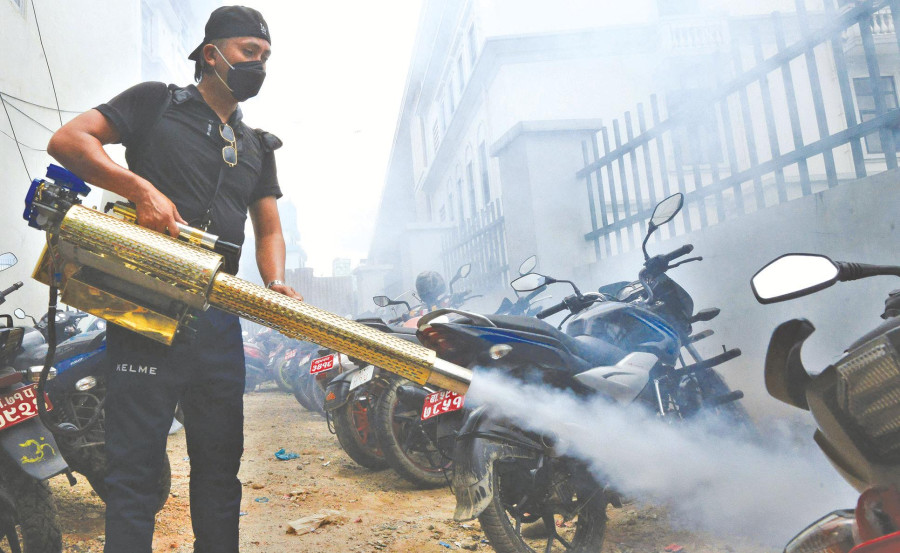Health
Infected with dengue? Telemedicine can be an option when hospitals close
Doctors advise people with high blood pressure to stop the medicine for a few days if infected with dengue.
Arjun Poudel
On Sunday, a man from the Bhaisepati area of Lalitpur contacted Danfe Care, an organisation that runs telemedicine services.
The man told doctors serving at the telemedicine service of the organisation that his 77-year-old mother, who is hypertensive and has been taking medicines for blood pressure, tested positive for dengue virus.
“His concern was if his mother should continue medicines of blood pressure or not during dengue infection,” said Dr Sitaram Katuwal, who handles phone calls at the organisation’s telemedicine service. “We suggested she stop taking medicines of blood pressure for a few days, as continuing such medicines could increase the risk of internal bleeding.”
Amid the spread of the dengue virus throughout the country, the number of desperate phone calls from seriously ailing patients and their family members has been growing at the centre’s toll-free number [015970144].
Officials at the organisation said that any patient infected with dengue virus and is facing problems could contact the toll-free number for medical help.
And if infected during the Dashain holidays and need medical help, one could also contact doctors at the organisation. Doctors virtually enrol infected patients and monitor their health condition regularly for the next 10 days.
People are worried about the growing scourge of the dengue virus, which has already spread in all the districts across the country, amid the Dashain holidays, in which chances of getting medications is very low.
The organisation does not charge anyone, but patients may sometimes have to undergo some lab tests. Officials say patients can undergo tests in laboratories near them and send reports to doctors at the organisation.
Most of the people making calls at the centre's toll-free number either have serious ailments themselves or call on behalf of their family members with concerns about their health conditions and medications they have been taking, officials at the organisation say.
“We receive over 50 phone calls from infected patients daily,” said Katuwal. “We provide free advice to all and admit infected patients virtually.”
As health complications of patients could vary with each, doctors say every severe patient may need separate consultation and monitoring.
A few days ago, a family member of an 87-year-old man who had been infected with the dengue virus contacted the organisation’s hotline number. Doctors at the centre referred the patient to Norvic Hospital at the request of the patient’s family members, as his health condition was serious and had several underlying conditions including high blood pressure and asthma.
Doctors at the organisation say they refer only serious patients to the hospitals when they feel that the patient needs hospitalisation.
Dengue is a mosquito-borne disease transmitted by female Aedes aegypti and Aedes albopictus mosquitoes. The same vector also transmits chikungunya, yellow fever, and Zika viruses, according to the World Health Organisation.
So far, 39 people have died and over 30,000 people have been infected by the dengue virus in the country.
Some additional deaths are being verified to confirm if it was due to the infection of the virus or not, officials said.
This is the first time so many people have succumbed to dengue virus in Nepal. Experts say reported cases of dengue might not reflect the real picture as around 90 percent of the infected people do not show any symptoms.
Asymptomatic people can easily spread the disease through vectors (disease-carrying mosquitoes), according to experts.
Experts warn of an increase in new cases during the festivals both in cities and villages. Hundreds of thousands of people residing in big cities including the capital city Kathmandu are returning to their home villages to celebrate Dashain festival with their families.
The vector of the dengue virus has already spread to most of the districts, and the risk of infection grows in remote places. Doctors say that once infected, a dengue spreading vector spreads the virus and the entire new generation of the mosquito gets infected.
“Dengue search-and-destroy drives could be stopped and health facilities may also lack health workers,” said Dr Sher Bahadur Pun, chief of the Clinical Research Unit at Sukraraj Tropical and Infectious Disease Hospital. “And if the collection of garbage is halted during the festival, the vector's number would increase, which means an increase in dengue cases in the coming days.”
Experts say the search-and-destroy campaign is the most effective method to eliminate the breeding sites of dengue-spreading mosquitoes and to raise awareness among the people to take precautions.
They say that the lackadaisical approach of the authorities concerned is responsible for the rampant spread of the virus throughout the country, warning that the ongoing spread of the virus could continue until November.
Mild to high fever, severe muscle pain, rashes, severe headache, and pain in the eyes are some of the symptoms of dengue, according to doctors. Dengue cases have been detected every month since January. The virus has already become endemic to Nepal, according to public health experts.
Nepal also witnessed a major dengue outbreak in 2019 when six people had died and over 17,000 were hospitalised.
The World Health Organisation says there is no specific treatment for severe dengue, but early detection and access to proper medical care can lower the fatality rate.




 9.51°C Kathmandu
9.51°C Kathmandu















